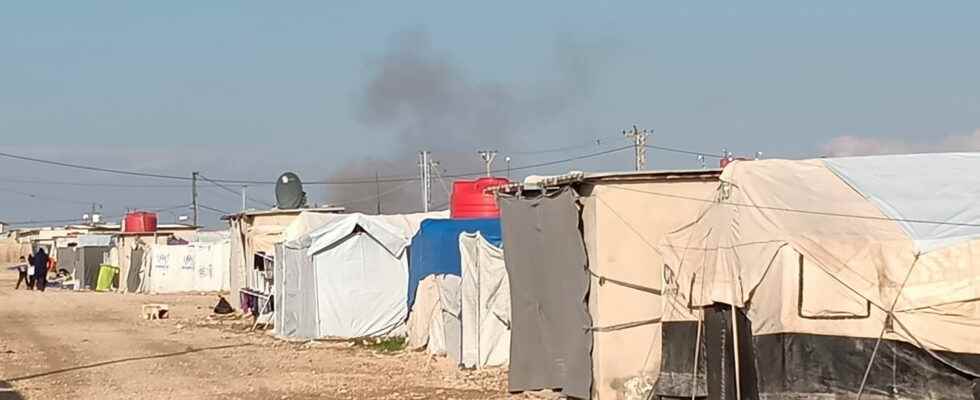Left to do jihad in Syria in 2012, the Frenchwoman Emilie König was repatriated to France with 15 other women on Tuesday July 5. Indictment and pre-trial detention, what is his future?
Emilie König is the best known of the 16 jihadist women repatriated from Syria to France on Tuesday July 5. Leaving in 2012, she joined her husband there, leaving behind two children. She then appeared in several Islamic State propaganda videos. Her commitment alongside Daesh led her to be blacklisted as “foreign terrorist fighters” in the United States in 2015. Detained in a camp in northeastern Syria run by Kurdish authorities since 2017, she expressed for several months his desire to return to France. Upon her arrival in Paris, Emilie König, now 37, was indicted and remanded in custody. “Her state of mind, she allowed me to tell you, is her desire to cooperate with French justice,” said her lawyer, Me Emmanuel Daoud, on Franceinfo.
Still according to her lawyer, Emilie König’s primary desire is to find her five children: two who remained in France with their grandmother in 2012, and three born in Syria from a second marriage, repatriated by the French authorities in January 2021. But does Emilie König have a chance of being released? For the time being, she is indicted for “criminal terrorist association” and imprisoned. Known to the French authorities before her departure in 2012, her appearance in propaganda videos and her phone calls to France aimed at pushing relatives to commit attacks will be heavy elements in her file.
Who is Emilie König, one of the 16 jihadist women repatriated to France on Tuesday July 5?
On July 5, the French authorities repatriated 35 French minors and 16 jihadist mothers held in a Syrian camp. Among the latter, Emilie König is the best known figure. Having left to do jihad in Syria in 2012, she was the first woman to be added to the United States’ blacklist of “foreign terrorist fighters” in 2015. The reason: having “ordered individuals to attack institutions French governments”.
For Emilie König, the process of radicalization began with meeting her first husband of Algerian origin, sentenced to prison for drug trafficking. Previously, the young woman had followed a normal schooling in Lorient, a CAP of sale in alternation. Following the meeting of her first husband, she converted to Islam, completely veiled herself and began to frequent the Nantes Islamist group Forsane Alizza.
Jihadist propaganda videos and phone calls to France
In 2010, Emilie König was pinned in front of the Lorient mosque distributing leaflets calling for jihad. Two years later, she provoked an incident with a security guard at the Lorient court where she was summoned, refusing to reveal herself and posting the video of the incident on the internet. At that time, she traveled regularly to Paris to demonstrate and recruit other young women. She was then noticed by the French authorities who banned in the summer of 2012 “any movement or transfer of funds” for her benefit. Shortly after, she decided to go to Syria to join her husband, who had joined the future Daesh group.
Emilie König then engaged in terrorist propaganda missions. Although she left her two children behind and her husband was killed, her commitment did not waver and she appeared in several Daesh videos. From Syria, she made several calls to relatives who remained in the country, intercepted by intelligence, aimed at convincing them to attack French institutions and the wives of French soldiers. She married another Frenchman converted to Islam and left for Syria, Axel, a Nîmes, with whom she had three children. The latter were repatriated in early 2021 to France.
What is Emilie König’s defense?
Tuesday July 5, the day of Emilie König’s return to France, her lawyer, Me Emmanuel Daoud, assured Franceinfo of his client’s desire “to cooperate with French justice”. “She will have to give explanations because the way she has been portrayed does not correspond to reality”, also confided the lawyer. According to him, Emilie König wanted to return to France to “explain herself and to try as quickly as possible, according to a deadline that she does not control, to see her children again”. More generally, Me Daoud pleaded the need to “allow these women to explain their journey”, adding that some “were under the influence and that we were in a particular context” when they left.
For her part, Emilie König confided to AFP in April 2021, from Syria: “I don’t see why I’m going to prison. I think it’s unfair, because I haven’t done anything, I don’t I have no blood on my hands.” She said she wanted “to resume a professional life”, acknowledging that her departure for Syria had destroyed “all [s]life”. Arrived in Paris, she confided to the judge of freedoms and detention her desire to find “a woman’s life”. Her mother, questioned by West Francebelieves that Emilie König “is going to be condemned and it is normal that she pays her debt”, even if she judges that her daughter deserves “a second chance, especially since she has returned to her normal state” .
